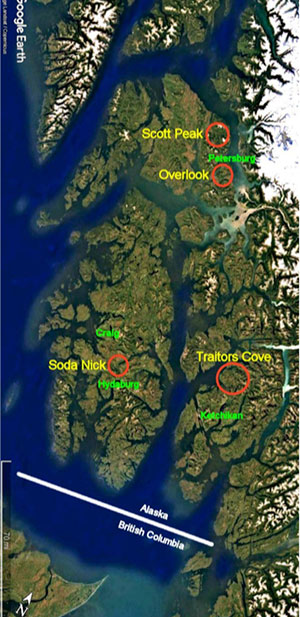
9th Circuit Court Voids Four Timber Sales in Tongass National ForestBy MARY KAUFFMAN
November 29, 2018
The plaintiffs say the court's decision stops four timber sales that would have clearcut 1,700 acres of old-growth rainforest - habitat that is critical to deer, which are the primary prey of the rare Alexander Archipelago wolf (or "Islands Wolf"), and vital to subsistence hunters. The lawsuit focused on all three -- deer, wolves, and hunters. In 2016, the U.S. Fish and Wildlife Service denied Endangered Species Act protection to Alaska’s Alexander Archipelago wolf. And according to the Alaska Department of Fish and Game, the Alexander Archipelago wolf is a subspecies of the gray or timber wolf found in southeast Alaska. The plaintiffs won on grounds of both the National Forest Management Act (NFMA) and National Environmental Policy Act (NEPA). "But the victory is for more than deer, wolves and hunters," said Larry Edwards, a representative of Greenpeace and resident of Sitka, Alaska. "It also protects many other kinds of wildlife in those areas, diverse forest uses, and carbon that is stored in the soil, trees and vegetation. As a far-north coastal rainforest, fires are rare and very small here, and as a result the Tongass is world-renown for storing carbon in its soil, trees and vegetation." At issue in the litigation was how the Forest Service determined impacts of the logging projects on Sitka black-tailed deer, and consequently wolves and hunters. The Court concluded that the agency's modeling of deer winter habitat "does not accurately measure forest structure [and] was too unreliable to be used." It also said the "USFS failed to explain why it was authorizing the projects despite lower-than-recommended deer habitat capabilities." (The recommended minimum capability is specified in the Tongass Forest Plan.) In voiding the agency's approvals of its four projects, the court noted that in "over a decade of litigation ... USFS has been given multiple opportunities to correct flaws in its project analysis and ignored the court's guidance." "The Forest Service was handed a clear message today [Wednesday] that it cannot fudge the science in order to give its projects an 'easy pass' and sell excessive amounts of timber from a planning area," said Chris Winter of Crag Law Center, one of the plaintiffs' attorneys. "The Islands Wolf is a rare species in Alaska's rainforest, and it's vital that the agency follow the best science on how to protect it and how to provide for the needs of deer hunters." "The Forest Service has scheduled two of the projects in our lawsuit to be logged in 2019. The court's verdict invalidating the decisions comes just in time." said Gabriel Scott of Cascadia Wildlands. "The Forest Service greatly overestimated the habitat available for deer, and consequently underestimated the impacts of logging, not just in the four projects in this case but in every one of its timber project decisions made between 1996 and 2008," Edwards said. "This justified logging which should never have happened. Greenpeace and Cascadia have demonstrated, with the agency's own documents, that its computer models were flawed. For recent projects the USFS has corrected those errors, but it refused to do so for the earlier ones," he said. Attorneys representing the plaintiffs were Chris Winter and Oliver Stiefel of Crag Law Center based in Portland, Oregon, and Rene Voss of Mill Valley, Ca. Plaintiffs expressed gratitude to the McIntosh Foundation for supporting the Islands Wolf litigation, from the beginning. These are the four timber projects, named from north to south are:
Together, the four projects would have cut 33 million board feet of timber from 1,700 acres of old-growth forest, and about 14 miles of logging roads would have been constructed. In its November 28, 2018 written decision, the 9th Circuit Court reversed the grant of summary judgment, vacated the denial of Greenpeace’s motion to enforce, and remanded with instructions to grant the motion to enforce, and vacated the USFS’s approval of the four timber sale projects. A memorandum decision is a written decision, issued by a court, which reports the ruling, and the decisions and orders of the court. It does not, however, contain an opinion, which is an explanation of the rationale upon which the decision was based.
On the Web:
Editing by Mary Kauffman, SitNews
Source of News:
Submit A Letter to SitNews
Stories In The News Ketchikan, Alaska
|
||||
